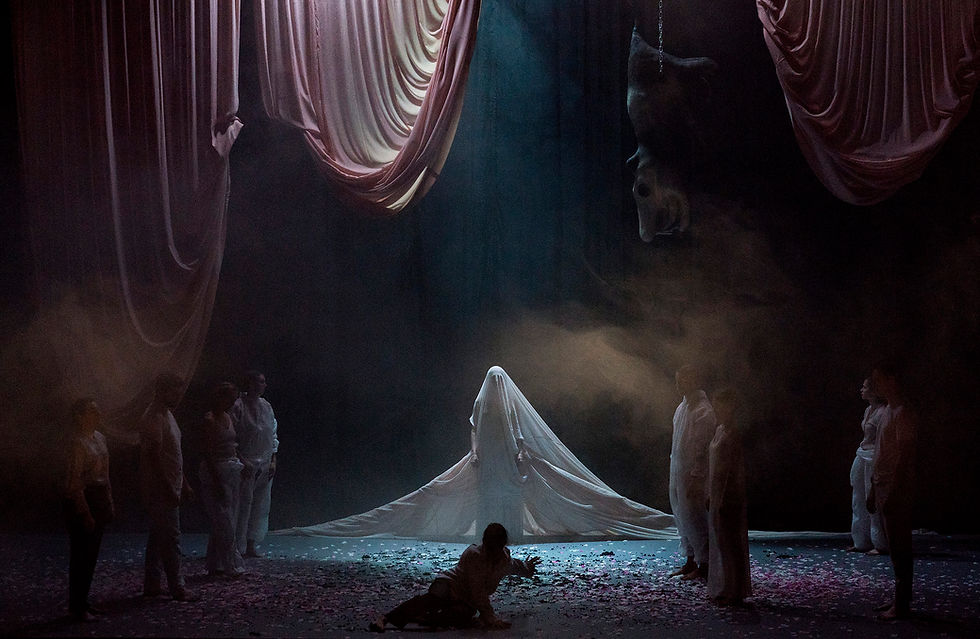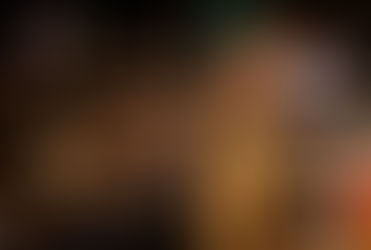Orfeo Ed Euridice
- Chris ORourke
- Feb 9, 2019
- 4 min read

****
A Heavenly Hell
Director and choreographer Emma Martin allows “Orfeo Ed Euridice” to open conventionally enough. Then the pounding drum beats start. Black hooded mourners presently appear and behind a veiled curtain singing begins. There may be a funeral onstage, but there’s a marriage taking place between the contemporary and traditional as both are juxtaposed and harmonised to near perfection. Several things soon become clear. Irish National Opera’s co-production with United Fall, in partnership with Irish Baroque Orchestra, of Gluck’s “Orfeo Ed Euridice” is something that little bit special. Showing an inspired choice in director and choreographer, Emma Martin, who delivers a brave, bold, brilliant production touched by moments of genius.

Under Martin’s jurisdiction, “Orfeo Ed Euridice” delivers a thoughtful, well balanced fusion of contemporary dance and traditional singing. Rather to be expected, perhaps, given that Gluck’s “Orfeo Ed Euridice,” with libretto by Ranieri de’ Calzabigi, originally included dance, being an azione teatrale in three acts. But Martin does it in such a way as to honour Gluck’s spirit of newness and inventiveness, his “Orfeo Ed Euridice” experimenting with operatic form and structure when first produced in 1762. Its simple premise, based on the Greek myth of Orpheus and Eurydice, sees Orfeo descending into hell to reclaim his lost love, Euridice. Rich with drama, overflowing with grieving and longing, all underscored by an impossible hope, Gluck sets out to foreground the emotive experience. The anguish as the Gods, answering his longing, allow Orfeo to venture to the underworld, challenge the Furies, and reclaim his love. Imposing one near impossible condition, that he must not look at Euridice until he has brought her safely back to the light.
Throughout, Martin and her team take some brave and brilliant risks to bring Gluck’s heart breaking opera to life. If not all will be to everyone's taste, there's no denying their potency. Catherine Fay’s adaptable costumes marvellously convey the contemporary and funereal in the first act, even if white boiler suits in the second don’t succeed quite as well. While initially Euridice’s spectral costume proves visually impressive, with the cast negotiating its specific demands with deft assurance, it runs the risk of depersonalising the already abstract Euridice even further, reducing her from a character to a device, risking the whole experience becoming Orfeo The Opera.

A risk avoided with conductor Peter Whelan, along with some superb playing by the Irish Baroque Orchestra and some sublime singing throughout, ensuring the anguish and torment at the heart of Gluck’s opera are wonderfully conveyed. Sabine Dargent’s set design and Stephen Dodd’s lighting design both deliver masterclasses in establishing mood and atmosphere. Dargent’s rich minimalism excels in its exquisite interplay of evocative details as drapes rise and fall, a wreath delivers an array of visual wonders, and falling particles suggest ash, leaves, or snow all at once. All anchored down in a world darkened by anguish, which Dodd’s superb lighting wonderfully conveys, with both Dargent’s set and Dodd’s lighting transitioning between scenes superbly. Even allowing for the obvious accommodations required when touring.
Visually, Martin’s choreography, along with her direction, has moments of sheer brilliance. Throughout, Martin’s tableau driven movement sequences prove visually stunning, with dancers and singers operating as a well knit ensemble. From intimate group articulations suggestive of Cerberus guarding the gates of hell, to a Furies unflinchingly challenging gaze, Martin’s extraordinary attention to detail sees pained movements flowing in and out of stillness. So much so that the decision to exclude movement for most of the third act, allowing focus settle on singing during a duet between a veiled Euridice and a tormented Orfeo, proves to be something of a pyrrhic victory. It’s not simply that dancers Robyn Byrne, Stephanie Dufresne, Sophia Preidel and Javier Ferrer are constantly sublime, individually and collectively articulating some stunning sequences. Their group movement pieces that include their physically expressive singers are also superb, so brilliantly executed you sometimes can’t tell dancer from singer. Like a silent Greek chorus, dancers and singers offer subtext, mood and commentary through tableau, movement, and song. Delightfully so during a deliciously irreverent, tongue-in-cheek take on a happy ending, honouring as it subverts the conventions of 1762, paced to feel like a deliberate tag on, or a joyous epilogue, poking playful fun at the conventions of modern musical theatre perhaps.

Ultimately, “Orfeo Ed Euridice” is all about the singing. Something Martin never loses sight of. If “Orfeo Ed Euridice's” heightened grief can lend itself to easy exaggeration and overwrought melodrama, neither pitfall poses any real problem here. Throughout, Martin keeps mood and emotion in the realm of the truthful. Due in no small measure to some top class singing by Baritone Matthew Mannion, Tenor Fearghal Curtis, Mezzo-Soprano Dominica Williams and Soprano Emma Nash. Soprano Sarah Power as the veiled Euridice, deprived of all expression except gesture, places her voice under greater scrutiny and reveals just how wonderful it is in the process. A superlative Sharon Carty, carrying the lion share of the vocals, perfectly pitches mood and emotion with some sublime singing in which if you feel the restraint, you never feel the reins. So that when she gently accentuates during the third act aria, Che farò senza Euridice? (What shall I do without Euridice?) it borders on the heartbreaking.

Following its hugely successful opening in the Civic Theatre, Tallaght on February 7 and 8 to launch Irish National Opera’s 2019 programme, “Orfeo Ed Euridice” undertakes a national tour, ending in the National Opera House, Wexford on March 2. If you were unfortunate to have missed this superb production last year during Irish National Opera's inaugural season, do not make the same mistake twice. With “Orfeo Ed Euridice” Irish National Opera nail their colours firmly to the mast. Brave, bold, breathtaking and risk-taking, multidisciplinary yet uniquely operatic, visually, vocally, sensually stunning, combining contemporary with the traditional, “Orfeo Ed Euridice” sees Irish National Opera succeeding beyond its own wild ambitions. An experience not to be missed.
Irish National Opera’s co-production with United Fall, in partnership with Irish Baroque Orchestra of Christoph Willibald Gluck’s “Orfeo Ed Euridice” is currently on national tour.
For more information on dates and venues, visit Irish National Opera.





















